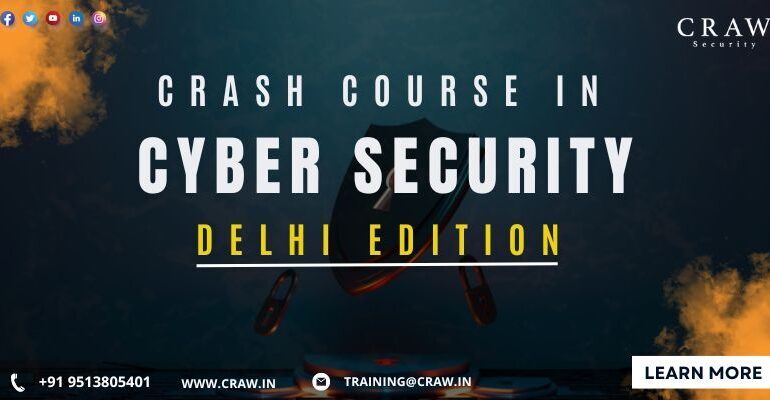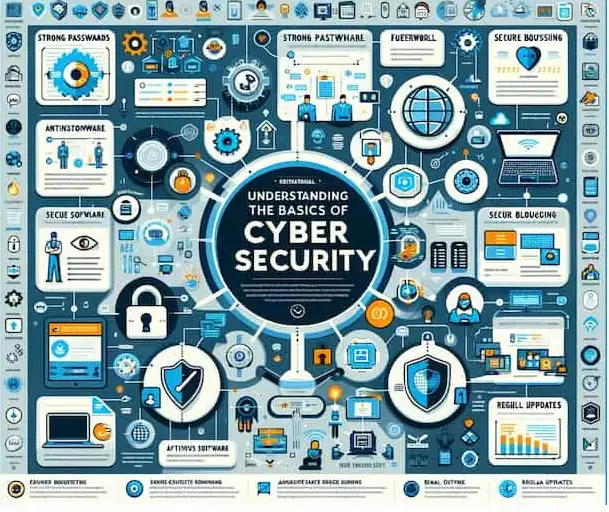Crash Course in Cyber Security Delhi, India

Crash Course in Cyber Security Delhi, India
Introduction to Cyber Security in Delhi
Delhi has become one of the most popular cities in the world known for its awareness about technology and cyber security. Companies ranging from low-scale businesses to high-scale businesses need cybersecurity solutions to fight against online threats.
Such threats include – ransomware, viruses, phishing, social engineering, and many others. These threats come with a lot of risks for the individuals and companies holding sensitive information. Thus, learning cybersecurity will be beneficial for students/ professionals.
If you are one of them, then you can definitely start learning about cybersecurity fundamentals in Delhi by getting in contact with professionals. What are we waiting for? Let’s get straight to the topic!

Why Choose a Crash Course in Cyber Security?
Craw Security offers the Crash Course in Cyber Security Delhi with a lot of amazing facilities for aspirants who want to enhance their knowledge & skills in cyber security under the guidance of professionals.
Some of the facilities offered on the premises of Craw Security include – Ebooks, the latest cyber security tools, and virtual labs. These amazing facilities will give you real-life experience while solving cybersecurity issues. What are you waiting for? Contact, Now!
Understanding the Basics of Cyber Security
The technique of preventing illegal access, attacks, and damage to computer systems, networks, and data is known as cybersecurity. It includes a variety of tactics, tools, and industry best practices to guarantee the privacy, accuracy, and accessibility of data.

Using firewalls and antivirus software, creating strong passwords, upgrading software often, and teaching users how to spot and steer clear of any risks are all important components. In the digital age, cybersecurity is essential for reducing risks and protecting against online attacks that could jeopardize an individual’s, an organization’s, or the country’s security.
To combat new and complex cyber-attacks, the field must constantly learn and adapt.
Delhi’s Cyber Security Training Landscape
- Training Institutions:
Numerous training facilities and schools in Delhi provide cybersecurity courses, from intensive degree programs to short-term certifications. The Indian Institute of Technology Delhi (IIT Delhi) and other private training facilities are notable establishments.
- Certification Programs:
Industry-recognized cybersecurity certification programs like Certified Information Systems Security Professional (CISSP), Certified Ethical Hacker (CEH), and others are offered by several training providers in Delhi. These certificates improve a person’s employability and skill set in the cybersecurity industry.
- Corporate Training Programs:
Several cybersecurity training organizations work with Delhi-based enterprises to offer their staff specialized training courses. These initiatives concentrate on tackling certain cybersecurity issues that businesses encounter.
- Workshops and Seminars:
Delhi organizes conferences, workshops, and seminars on cybersecurity, bringing professionals, experts, and enthusiasts together to exchange information on the newest developments, security risks, and industry best practices.
- Government Initiatives:
The Delhi government may launch initiatives to improve workforce cybersecurity capabilities in coordination with national cybersecurity authorities. By addressing the increasing issues in the digital realm, these projects hope to increase the population’s awareness and expertise.
Course Curriculum Overview
| Module Number | Course Content |
|---|---|
| Module 01 | Introduction to Basics of Ethical Hacking |
| Module 02 | Foot-printing Active (Tool-Based Practical) |
| Module 03 | Foot-printing Passive (Passive Approach) |
| Module 04 | In-depth Network Scanning |
| Module 05 | Enumeration User Identification |
| Module 06 | System Hacking Password Cracking & Bypassing |
| Module 07 | Viruses and Worms |
| Module 08 | Trojan and Back door |
| Module 09 | Bots and Botnets |
| Module 10 | Sniffers MITM with Kali |
| Module 11 | Sniffers MITM with Windows |
| Module 12 | Social Engineering Techniques Theoretical Approach |
| Module 13 | Social Engineering Toolkit Practical Based Approach |
| Module 14 | Denial of Service DOS & DDOS Attacks |
| Module 15 | Web Session Hijacking |
| Module 16 | SQL Injection Manual Testing |
| Module 17 | SQL Injection Automated Tool-Based Testing |
| Module 18 | Basics of Web App Security |
| Module 19 | Hacking Web servers Server Rooting |
| Module 20 | Hacking Wireless Networks Manual CLI Based |
| Module 21 | Hacking Wireless Network |
| Module 22 | Evading IDS, Firewall |
| Module 23 | Honey pots |
| Module 24 | Buffer Overflow |
| Module 25 | Cryptography |
| Module 26 | Penetration Testing: Basics |
| Module 27 | Mobile Hacking |
| Module 28 | Internet of Things (IoT) Hacking |
| Module 29 | Cloud Security and many more |
Career Opportunities Post-Crash Course Completion
Following a crash course in cybersecurity, people can apply for a variety of entry-level positions. Here are eleven possible positions:
-
Position Responsibilities Qualifications Security Analyst Implement security measures, monitor security alerts, and assess risks. Basic knowledge of cybersecurity principles and tools. IT Support Specialist Assist with technology issues, troubleshoot, and ensure system security. Proficiency in cybersecurity fundamentals and IT support. Network Administrator Manage and maintain computer networks to ensure secure and efficient data transfer. Knowledge of network configuration and security. Security Awareness Trainer Train employees and provide education on cybersecurity best practices. Strong baseline understanding of cybersecurity and excellent communication skills. Junior Penetration Tester Assist in finding and exploiting vulnerabilities to test system security. Familiarity with penetration testing methods. SOC Analyst Analyze logs, plan incident response, and monitor for security incidents. Understanding of incident response and SOC operations. Compliance Analyst Ensure adherence to cybersecurity policies and legal requirements. Knowledge of cybersecurity compliance frameworks. Entry-Level Cybersecurity Consultant Advise clients on enhancing their cybersecurity posture. Basic expertise in cybersecurity and consulting skills. Incident Responder Investigate cybersecurity incidents and act to mitigate their impact. Knowledge of incident response protocols. Junior Security Engineer Help design and implement network and system security solutions. Basic understanding of security engineering principles.
Cyber Security Tools and Technologies
| S.No. | Tools | Define |
| 1. | Firewalls | ● Firewalls serve as a barrier between a trusted internal network and untrusted external networks by monitoring and regulating incoming and outgoing network traffic following predefined security policies.
● Firewalls are essential for controlling network traffic, guarding against cyberattacks, and blocking unwanted access. |
| 2. | Intrusion Detection System (IDS) / Intrusion Prevention System (IPS) | ● Whereas IPS goes above and above by actively blocking or stopping threats in real-time that are discovered, IDS recognizes and reacts to possible security dangers.
● By identifying and reducing unwanted activity, these solutions improve network security and offer a proactive barrier against cyberattacks. |
| 3. | Antivirus Software | ● Malicious software, including viruses, worms, and malware, is found, stopped, and eliminated from computer systems by antivirus software.
● Antivirus software is crucial for endpoint protection since it protects networks and devices from a variety of online threats. |
| 4. | VPN (Virtual Private Network) | ● With the use of virtual private networks (VPNs), users can safely access private networks via public networks and ensure secure data transmission.
● Essential for safeguarding data privacy and enabling secure remote access, particularly when connecting to business networks from outside locations or utilizing public Wi-Fi. |
| 5. | SIEM (Security Information and Event Management) | ● SIEM solutions assist enterprises in identifying and handling security issues by gathering and analyzing log data from multiple systems.
● SIEM technologies facilitate real-time threat identification and incident response by offering a consolidated picture of an organization’s security posture. |
| 6. | DLP (Data Loss Prevention) | ● Data loss prevention (DLP) tools lower the risk of data breaches and guarantee compliance by preventing unauthorized access, use, or transmission of sensitive data.
● DLP solutions are essential for safeguarding sensitive data since they provide enterprises control over their data and stop data leaks. |
| 7. | Encryption Tools | ● Data secrecy is ensured by encryption tools, which encrypt data using algorithms and render it unreadable without the proper decryption key.
● Encryption prevents unwanted access to data and is crucial for protecting sensitive data both during transfer and storage. |
| 8. | Penetration Testing Tools | ● Tools for penetration testing mimic cyberattacks to find holes in networks, applications, or systems.
● Penetration testing tools are essential for evaluating an organization’s security posture because they find and fix vulnerabilities before bad actors can take advantage of them. |
| 9. | Web Application Firewall (WAF) | ● Web application firewalls (WAF) guard against a range of online dangers, such as SQL injection, cross-site scripting (XSS), and other weaknesses.
● Vital for protecting web apps and stopping attacks that go after application layer vulnerabilities. |
| 10. | HIDS (Host-based Intrusion Detection System) | ● HIDS keeps an eye on what happens on certain hosts or devices, identifying and handling questionable activity at the endpoint level.
● Enhances network-level security measures by providing an extra layer of protection by concentrating on device security. |
Practical Applications of Cyber Security in Daily Life
Protecting Personal Data nowadays has become a pile of work for every person living on this planet. However, if you can get professional tips, then you can give it a shot to enhance your security measures online. Following are some of the Best Practices for Online Safety, that you can use to protect yourself from being victimized:

- Use Strong Passwords:
Make complicated passwords by combining characters, digits, and symbols; stay away from utilizing information that can be guessed easily, such as birthdays.
- Enable Two-Factor Authentication (2FA):
Whenever possible, enable 2FA to add a layer of security by demanding a second verification step in addition to your password.
- Keep Software Updated:
Update operating systems, antivirus software, and applications regularly to guarantee the newest security features and fix vulnerabilities.
- Beware of Phishing Attacks:
To avoid falling for phishing scams, use caution while clicking on unsolicited emails, texts, or links. You should also refrain from giving personal information to unidentified sources.
- Use Secure Wi-Fi Connections:
Use a strong password and encryption to secure your home Wi-Fi to prevent unwanted access, especially while using it for private or sensitive online activity.
- Review Privacy Settings:
Maintain control over the information you share with others by checking and adjusting privacy settings on social media sites and other online accounts regularly.
- Be Skeptical of Public Wi-Fi:
Steer clear of using public Wi-Fi networks to view sensitive data or conduct financial transactions as they could be targeted by hackers.
- Regularly Back Up Data:
To lessen the effect of probable data loss due to cyber catastrophes, backup crucial files and data to an external drive or cloud service.
- Install Reliable Security Software:
To offer real-time protection against a variety of online threats, use reliable antivirus and anti-malware software, and make sure it is up to date.
- Educate Yourself:
Learn from reliable sources about the most recent cybersecurity threats and best practices. You should also equip yourself with knowledge about how to identify and handle any online hazards.
Advanced Topics in Cyber Security
The Emerging Trends and Future Directions can lead you to a specific career option in the IT Sector with the vision of Specialized Areas of Study. Cybersecurity advanced topics encompass specific domains that necessitate profound comprehension and proficiency. Three advanced subjects are explained here:
| Cybersecurity Concept | Explanation | Key Concepts |
|---|---|---|
| Blockchain Security | Blockchain is a distributed and decentralized ledger technology, mainly known for its use in cryptocurrency. It involves protecting the confidentiality and integrity of data on the blockchain, including safeguarding consensus processes, and smart contracts, and defending against vulnerabilities like 51% attacks. | Cryptographic hashing, decentralized identity management, smart contract security audits, and consensus methods like Proof of Work and Proof of Stake. |
| Zero Trust Architecture | Zero Trust is a security model that operates on the principle of not trusting anyone by default, even those within an organization’s network. Every individual and device attempting to access the network must be verified, and access is restricted to only those who need it, with continuous monitoring. | Strong encryption methods, least privilege access, micro-segmentation, continuous monitoring, and multi-factor authentication. |
| AI in Cybersecurity | Artificial Intelligence is increasingly being used to enhance cybersecurity measures, including threat detection, incident response, and automated decision-making. AI algorithms analyze large datasets to identify patterns, anomalies, and potential security threats, improving the efficiency and accuracy of cybersecurity processes. | AI-powered security tools, machine learning, natural language processing, behavioral analytics, and automated threat detection and response. |
Certifications and Further Learning Paths
Understanding the Importance of Certifications in Cyber Security is necessary for having the best Pathways for Continued Learning. That’s because reputed certifications will allow you to work in reputed organizations as a professional for a long time.
After that, you can go for further certifications to continue your career by learning the latest concepts of cybersecurity. Craw Security can offer you the chance you are looking for. It has been offering the 1 Year Diploma Course in Cyber Security Training in Delhi for IT Aspirants to introduce the latest fundamental concepts of cyber security.
With that, one will get the chance to test their skills and knowledge via Virtual Labs introduced on the premises of Craw Security. After the completion of this amazing course, one will get a certification valid in several MNCs.
Thus, it will secure your chance of getting job opportunities in the IT Industry. What are you waiting for? Contact, Now!
FAQs
About Crash Course in Cyber Security in Delhi
1: What is a crash course in cybersecurity, and why is it important in Delhi?
The fast-track course you can do to brush up your skills in cybersecurity is highly known as Crash Course in Cyber Security. In a highly populated city like Delhi, it is very useful to do a Crash Course in Cybersecurity to understand the various functionalities of several black hat hackers that try to intervene in the varied systems, networks, and other IoT infrastructures for their own illegal benefits.
By doing this, you can understand the corresponding TTPs (Tactics, Techniques, and Procedures) of many malicious actors that can harm your IT architectures as well, whether you belong to any particular genre.
2: What topics are typically covered in a crash course in cybersecurity?
The mainstream topics that are covered in a crash course in Cybersecurity are as follows:
- Introduction to Cybersecurity,
- Cybersecurity Landscape,
- Security Domains,
- Security Frameworks and Standards,
- Physical Security,
- Incident Response and Forensics,
- Security Awareness and Training,
- Cryptography,
- Penetration Testing and Vulnerability Assessment,
- Cloud Security,
- Secure Development Lifecycle (SDLC),
- Wireless and IoT Security,
- Business Continuity and Disaster Recovery,
- Ethical, Legal, and Professional Issues,
- Emerging Trends, etc.
3: Who can benefit from a crash course in cybersecurity in Delhi?
Here’s a list of individuals who can benefit from such a crash course in cybersecurity in Delhi:
- Students and Fresh Graduates,
- IT Professionals,
- Entrepreneurs and Business Owners,
- Managers and Executives,
- Government Officials,
- Legal Professionals,
- Digital Marketing Professionals,
- Educators and Trainers,
- General Public,
- Non-Profit Organizations,
- Freelancers, etc.
4: How can I protect my personal and professional data in Delhi’s cyber-threat landscape?
By engaging in the below-mentioned safe practices, you can nicely protect your personal as well as professional data in Delhi’s cyber-threat landscape:
- Use Strong, Unique Passwords,
- Employ Multi-Factor Authentication (MFA),
- Keep Software Updated,
- Install Reliable Security Software,
- Be Cautious with Emails and Links,
- Regular Backups,
- Use a VPN for Extra Security,
- Encrypt Sensitive Data,
- Be Careful with Social Media,
- Educate Yourself and Others,
- Secure Physical Access,
- Secure Wi-Fi Networks,
- Check for Data Breaches,
- Monitor Bank and Credit Card Statements,
- Engage with Reputable Platforms, etc.
5: Are there any prerequisites for enrolling in a cybersecurity crash course in Delhi?
At Craw Security, there are no special prerequisites needed for enrolling in a cyber security crash course in Delhi. However, the person who is doing the crash course would surely be working as a cybersecurity analyst in any domain of cybersecurity in an organization.
Nevertheless, if the same person is not working anywhere in a cybersecurity-based company, one can also seek admission in the course provided by Craw Security as we do seek a 12th passed certificate from a recognized board from the candidate to provide admission in the corresponding course.
6: Is certification important in the field of cybersecurity?
Yes, certification is important in the field of cybersecurity for several reasons:
- Proof of Expertise,
- Career Advancement,
- Stay Updated,
- Hands-on Skills
- Professional Network,
- Building Trust,
- Regulatory and Compliance Needs,
- Structured Learning Path, etc.
Conclusion
Enrolling in a crash course in a cyber security program offers benefits beyond the mere enhancement of one’s résumé, as it serves as a crucial pathway towards protecting the integrity and security of our increasingly interconnected digital realm. With Delhi emerging as the focal point of India’s cyber security landscape, the present moment is an opportune time to delve into this field. Are you prepared to commence this exhilarating expedition?
In this context, we would like to suggest you try the best-in-class Crash Course in Cyber Security by Craw Security, the Best Cybersecurity Training Institute in Delhi NCR. For more info, give us a call at +91-9513805401 and ask all your queries to our highlighted educational counselors.

















